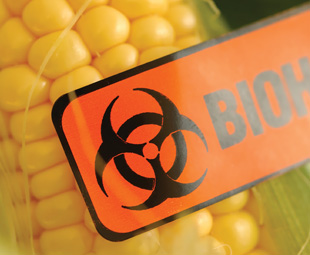Love and money, food and death

Royal Canin South Africa lost more than R90 million in the space of a few weeks when its products were found to contain traces of antifreeze. From toxic substances to labelling laws, those in the food sector carry a huge burden of responsibility. Awareness of legislation governing the industry is vital – it exists for two very good reasons.
The pet food contamination scandal of 2007 hit consumers where it hurts most – the heart. If ethelene glycol (antifreeze) is ingested by animals, it causes renal failure and results in death. Thousands of pets died worldwide. The extent of Royal Canin’s financial loss in South Africa was revealed in a 2010 Labour Court judgement.
Love and money. Two sure-fire ways to inflame passions. The litigious society we live in today means consumers have the upper hand. The threat of legal action is ever-present.
The purpose of the Consumer Protection Act, which was signed into law in 2009, is to promote a fair, accessible and sustainable marketplace for consumer products and services; to establish national standards to ensure consumer protection; to promote consistent legislature; and to promote responsible consumer behaviour.
The Act essentially protects the consumer from any unfair acts carried out by any service provider. It applies to all South Africans, and to every transaction that occurs with our borders. The CPA has put the power back in the consumer’s hands.
One aspect that is prevalent in South Africa is food contamination or food poisoning. Many of our people live in rural areas and are uneducated in the aspects of good hygiene. Ronel Burger, head of the Food Safety Initiative for The Consumer Goods Council agrees: “As a result of poverty, many South Africans are not able to adhere to all the food safety rules. They have inadequate storage and cooking conditions, due to the lack of appliances such as fridges. Affordability of the consumer basket remains a concern.”
According to ER24’s Dr Vernon Wessels: “Food poisoning is caused by food that has been contaminated with a living organism – such as bacteria, fungi, a virus or parasites – or a toxin or chemical that causes ill health in the affected individual.”
 The Foodstuffs, Cosmetics and Disinfectants Act states that selling, manufacturing or importing goods that are dangerous for human consumption or use is an offence. Whether the goods have decayed, contain a prohibited substance, are impure or have been altered for a greater mass, a court of law will prosecute anyone failing to abide by the Act.
The Foodstuffs, Cosmetics and Disinfectants Act states that selling, manufacturing or importing goods that are dangerous for human consumption or use is an offence. Whether the goods have decayed, contain a prohibited substance, are impure or have been altered for a greater mass, a court of law will prosecute anyone failing to abide by the Act.
The CPA states: “Producers, importers, distributors and retailers of any goods are each liable for any harm caused wholly or in part as a consequence of supplying unsafe goods caused by product failure, defect or hazard, inadequate instructions or warnings pertaining to any hazards arising from use of goods, irrespective of whether the harm resulted from negligence.”
Consumers no longer have to prove negligence by retailers or restaurants. All they need is proof that the product was contaminated in some way or that there was a foreign object in the product. The whole supply chain could be liable.
Not only will the company be involved in legal implications – the brand will also suffer. Brand image matters in business because it influences where people shop, what they buy and what services they choose to use.
Companies strive to avoid going to court. Having the whole country watch as a bulldog lawyer and 600 people from the press drag your life’s work through the mud is not something anyone wants.
Alternatives to litigation are settlements, mediations and arbitrations. It is generally wise at the onset of any litigation to review the potential for an out-of-court settlement. Settlements usually involve a contract and an exchange of money for the promise of secrecy.
Mediation is similar to a settlement but with the help of a mediator. The mediator’s role is to help the parties identify the risks of the case and encourage them to consider how those risks may affect their goals. Arbitration is a settlement technique in which a third party reviews the case and imposes a decision that is legally binding for both sides.
A settlement could not be reached in the case of Muzik versus Cafe del Mare. Muzik claimed he was poisoned as a result of eating decayed mussels. He was admitted to a hospital and after discharge had to receive further treatment. He sued Cafe del Mare for all his medical expenses, and legal bills, as well as “loss of enjoyment of life”. Muzik claimed he had always enjoyed seafood but was now unable to eat it because of a deep fear of being poisoned again. He won the case.
How can retailers and restaurants avoid buying products that are unfit for human consumption? The Consumer Goods Council’s Ronel Burger says retailers are responsible for the shelf life of products and expiry dates should always be closely monitored.
South Africa has stringent import regulations. All products entering our country – whether by land, sea or air – should by law be inspected. It is the responsibility of the importer to determine if a product meets regulation. Products are also checked for antibiotics, bacterium, pesticides and diseases.
Meat import is strictly regulated and only meat and poultry from approved abattoirs selected by the South African Director of Veterinary Sciences is allowed into the country. These abattoirs are monitored for compliance by the authorities, and the approved abattoirs list is updated bi-annually.
Once a product has entered the country it becomes the responsibility of retailers, distributors and restaurants, says Burger.
Labelling laws
The CPA’s disclosure-of-information requirements state plainly that suppliers may not display labelling that could mislead consumers about the contents.
 Labelling laws are possibly the strictest of all food-based laws. They have recently been updated to prevent companies from including information that causes confusion. In the past, it was acceptable for labels to read “excellent source of” or “enriched with”. This has been banned and replaced with phrases such as “low” or “virtually free” or “very high”.
Labelling laws are possibly the strictest of all food-based laws. They have recently been updated to prevent companies from including information that causes confusion. In the past, it was acceptable for labels to read “excellent source of” or “enriched with”. This has been banned and replaced with phrases such as “low” or “virtually free” or “very high”.
Products and labelling may not claim to provide balanced nutrition, may not imply that a product can cure a medical ailment, and cannot claim to be endorsed by health practitioners — and these are just wording details. All labels must contain mandatory nutritional information, dietary allowances, glycemic indexes, additives and allergens — the list goes on.
What else can be done to protect retailers, importers and restaurants from legal liabilities? Insurance is one of the most importance risk management tools for any business:
• Food product liability insurance is a specific insurance plan that most restaurants and retailers invest in – it provides monetary compensation should someone suffer injury from consumption of products.
• Contamination insurance policies are taken out to prevent losing money in the event of product spoilage. Large amounts of foods are kept in freezers, and should there be a power outage, these foods are likely to spoil. Contamination cover will replace the foods lost or provide monetary compensation.
The best way a food seller can mitigate risk is to shift it to another party. Careful drafting of clauses with suppliers to negotiate promises of indemnification, and selecting the correct laws, is crucial. It is also important to have a crisis management team that includes food experts, a lawyer and public relations people who will formulate a plan to minimise exposure and smooth over any legal pressures.
It’s remarkable to think about all the effort that goes into serving a simple Greek salad – the legalities involved with fresh produce and legally allowed volumes of pesticides, regulations regarding additives in dairy, genetically modified vegetables, preservatives, laws of transport and preparation. Suddenly a simple salad doesn’t seem so simple any more.



